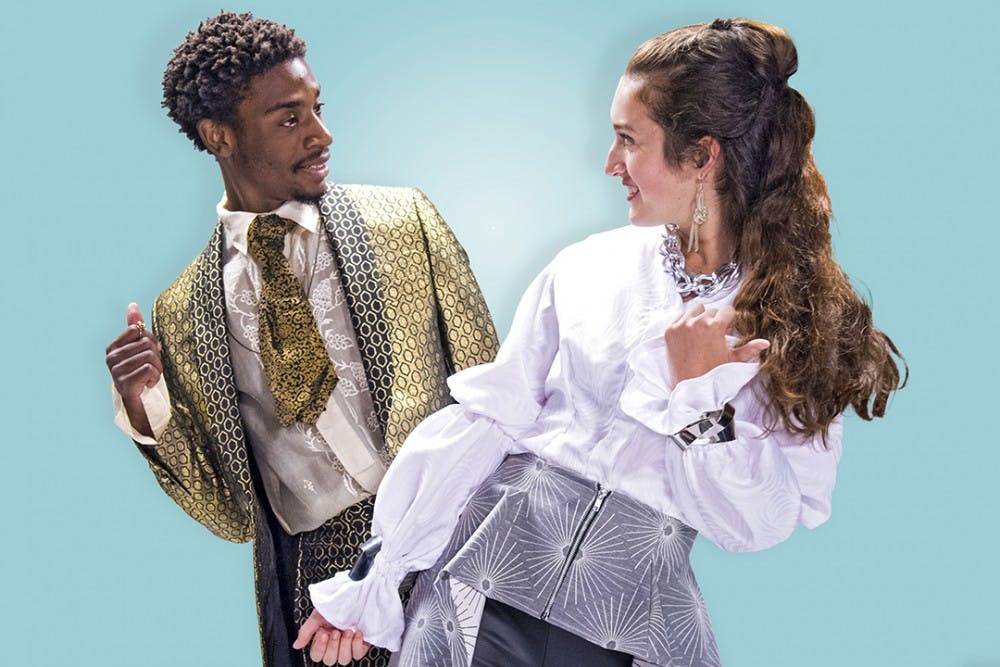While it is common to read Shakespeare at some point in school, students don't often see his work adapted through a modern lens. USC theater is shaking up the Shakespearean comedy "Much Ado About Nothing" in order to appeal to a 21st century audience.
Dustin Whitehead directs the play and said it is a coming-of-age love story. USC has performed a few Shakespeare-themed plays and scenes recently, including "Shakespeare in Love" and "Macbeth."
"The love for Shakespeare goes all the way back to 1600, and it's got this magic to it in the poetry that people get excited about," Whitehead said.
Fourth-year theater student Nick Good plays Don Pedro, a father figure in "Much Ado About Nothing." Good said he believes the theater program recreated "Much Ado About Nothing" in a way that will appeal to USC students.
"It’s one of those things that you have to get the college students into the theater to show them that this is an easy story to understand," Good said. "We made it as easy as humanly possible without changing the words for them to understand, especially with our modern take."
Whitehead said an important component of "Much Ado About Nothing" is the diverse cast and gender role switches from the original play. In that respect, the casting goes against tradition.
Originally a male character, Dogberry is female in USC's rendition. Fourth-year journalism student Cassidy Spencer plays Dogberry and said the character is silly and sporadic. Dogberry is responsible for cleaning duties in the play, but still has a say in other characters' decisions.
"Ultimately, I do actually help to reveal some of the trickery that’s happening and help everyone to actually be in love again," Spencer said.
Another character that breaks gender roles is Borachio, played by Jacob Wilson. The third-year theater student said his character is fun, outgoing and sexually fluid.
Wilson said while he's more different than similar to his character, they're both extroverted.
"Borachio's really conniving and slimy, and at least I don’t see myself as that," Wilson said. "But it’s been fun to play someone that’s kind of evil, in a sense."
Some of the characters, such as Benedick, are scared of love at first. Benedick is played by Anthony Currie, a third-year philosophy student. Currie said his character was a "fun-loving friend" who likes to joke around. Benedick refuses to fall in love or get married.
Another character not fond of falling in love is Beatrice, portrayed by third-year public relations student Jordan Postal. Postal said Beatrice is an independent character who does not let others influence her decision making.
"She knows her place in society and doesn't deal with anyone who puts her in a place that she feels like she doesn't need to be in," Postal said. "She doesn't feel like she has to change who she is to conform to anything, and she's very strong and independent in that."
On the other end of the spectrum lies Hero, a character who has no problem falling in love. Hero is played by second-year theater student Ezri Fender.
"Her dream, her entire life was, you know, to find a husband and fall in love. It’s very much like a fairytale thing, and she finds the love of her life through this play," Fender said.
Fender said she believes a lot of the audience will relate to her character because most people have attempted to change who they are in order to impress someone else.
Along with untraditional gender roles, Whitehead said "Much Ado About Nothing" takes a modernized spin on Elizabethan costume design.
"I've been working with the designers to find our set, and our costumes and our way of telling the story to make it our own," Whitehead said. "The scenery and the costumes are unique to this production, and you won't be able to see anything like them in any other production of 'Much Ado About Nothing' anywhere else."
He said the play is shorter, and though they kept the original Shakespearean language, they added contemporary music and dance.
The audience is meant to feel as if they are part of the show, Whitehead said. During certain scenes, the actors and actresses stand on platforms closer to the audience.
"It's immersive in that way that the actors might be right next to you, or right behind you, or to your left or right when they're in a scene or when they're entering or exiting, bringing you into the story more," Whitehead said.
USC's production of "Much Ado About Nothing" will run from Oct. 25 to Nov. 9 during various times at Longstreet Theatre. More information about dates and times can be found on the USC Theatre and Dance website.
Tickets are $15 for students and $22 for general admission.

